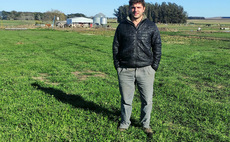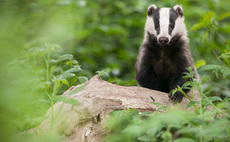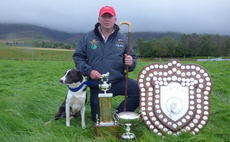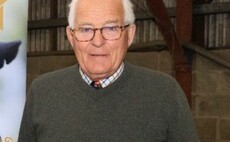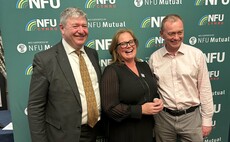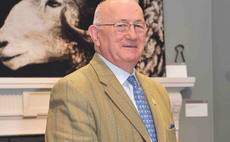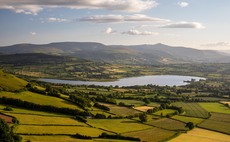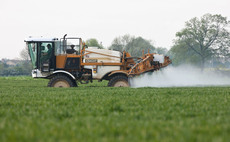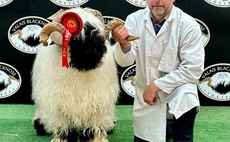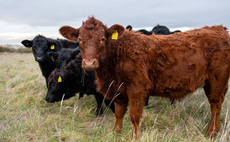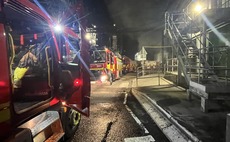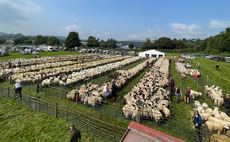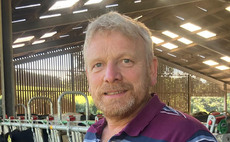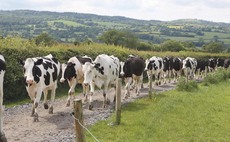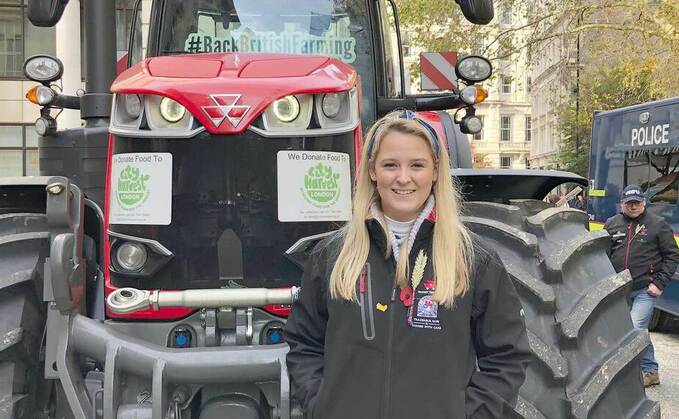
Sioned Davies had never considered a career in banking, but an opportunity to work at a lender which specialises in agriculture was too good to miss.
When Oxbury Bank launched in the UK farming sector, its founders were looking for staff which met its key needs - an understanding of agriculture and a drive to engage with farmers.
Co-founder Tim Coates says: "We did not want all banking experts - fundamentally we were looking for people with the right enthusiastic attitude and a real empathy with our farming customers."
Sioned Davies, 23, joined Oxbury in September 2020 as part of the bank's graduate placement with Harper Adams University (HAU).
Diploma
Coming from a family farm in Mid Wales, where her parents and brother run 1,000 ewes and up to 340 Welsh Black cattle, she was a member of the local Young Ãļ§Ö±²¥' Club and studied for an agricultural diploma alongside her A-levels.
She says: "I absolutely loved it and applied to the Agri Academy junior programme through Farming Connect."
This brought 12 young people together to examine different careers in agriculture and included a trip to Brussels to meet the NFU and AHDB teams, as well as the then Agriculture Commissioner Phil Hogan.
"Aged 17, it opened my eyes to how many opportunities are out there," says Miss Davies.
As a result, she applied to study agri-food marketing at HAU, which included a little bit of everything about farming and food production systems.
She adds: "It was ideal, as I still was not sure what I wanted to do as a career."
In her second year, Miss Davies got a placement with the Co-Op, working across different sectors of the industry and throughout the poultry supply chain.
"At that point I knew I wanted to work with farmers - I really liked being the link between the business and the farmer. That communication is really important and I wanted to work in that relationship area," she says.
Towards the end of her degree, she won a place as an NFU ambassador and travelled to Brussels with 10 other people from across Britain.
As well as attending the NFU conference she contributed to meetings in London.
In addition, she got a place on the Agri Academy senior programme in the winter of 2019 and visited the Netherlands with another group of youngsters to learn about progressive and innovative farming systems.
Experience
She says: "It is these kinds of experiences which I think are so important for your career development and confidence. I think it is vital to grab every opportunity to mix, meet and talk to new people - I have drawn experience from everyone, from a Syrian refugee who used to be a vet and is now working on a poultry farm, to the president of the NFU. It is a competitive world, so getting as much life experience as possible is vital."
Miss Davies first came into contact with Oxbury at the HAU careers day, which sparked a series of conversations and culminated in her applying for a graduate placement.
"The more conversations I had with them the more excited I felt. I had never thought about it as a career," she adds.
"Banking is quite a scary industry - you imagine London-based, stuffy stereotypes, and if my maths teacher knew I was applying to work in a bank she would have fallen off her chair."
Interview
After a successful interview process where she met the bank's founders, to gain exposure to the different elements of the bank, Miss Davies started in the underwriting team, which does a deep dive into loan applicants to ascertain the level of financial risk.
She then moved to the product and marketing team, before ending up in sales, which she loves.
"I manage relationships with farmers across south east England - if they apply for a loan or savings account I guide them through the process. Every farm is different so it is really interesting," she says.
"Being a 100 per cent agricultural bank, relationships are key," says Miss Davies.
"People want to be able to pick up the phone and speak directly to me, not some big call centre somewhere.
"They also want answers quickly, as often investment opportunities do not hang around. So I will help them to get all the information together - like a business plan and accounts - and will get an answer from the underwriting team within 24 hours."
So where does Miss Davies see her future?
"There is going to be a lot of change in the industry over the next five or 10 years; everybody is looking at the future of their business and how it is going to be affected by Brexit, loss of Basic Payments, climate change and tourism," she says.
Sustainability
"Sustainability is critical and we need to help farmers to deal with those challenges. For me, sustainability is the number one priority, whether you are in banking or anywhere else in the industry; both Oxbury and HAU's interest in sustainability are really important to me."
But the most important attribute is having a deep understanding of agriculture and empathy for farmers, she adds.
"Talking about finance in farming can be tricky. Ãļ§Ö±²¥ may be coping with bad weather or disease challenges, so you have to have that true understanding of what they are dealing with if you are genuinely going to help."
A view from Harper Adams University
Oxbury is working with Harper Adams University (HAU) to offer placement and graduate programmes, while also pulling together advice on sustainable farming for its own, and its clients', use.
Rebecca Payne, head of land and agribusiness management at HAU, says: "There are considerable ways to add value to each other; our agricultural economics team is crunching numbers and policy to help farmers make decisions.
"Through these kind of relationships we are linking our research to real-world businesses - taking our knowledge and turning it into actionable, valuable information."
The new School of Sustainable Food and Farming will develop this even further, creating blueprints for sustainable supply chains.
Deputy vice-chancellor Prof Michael Lee says: "The initial targets will be centred around how to achieve net zero UK agriculture.
"However, the ambition of the school will include wider aspects of sustainability, including biodiversity, animal welfare, rural community support, green energy production and farm profitability.
"The school will support and further develop production systems research geared towards more sustainable farming," he adds.
"Using knowledge from the research, the school will seek to develop practical advice and guidance to help farmers adjust their practices to be more sustainable through the development of short courses and apprenticeships.
"It will also drive change for undergraduate education across the portfolio of courses, embedding climate education to realise a thriving green circular economy."







